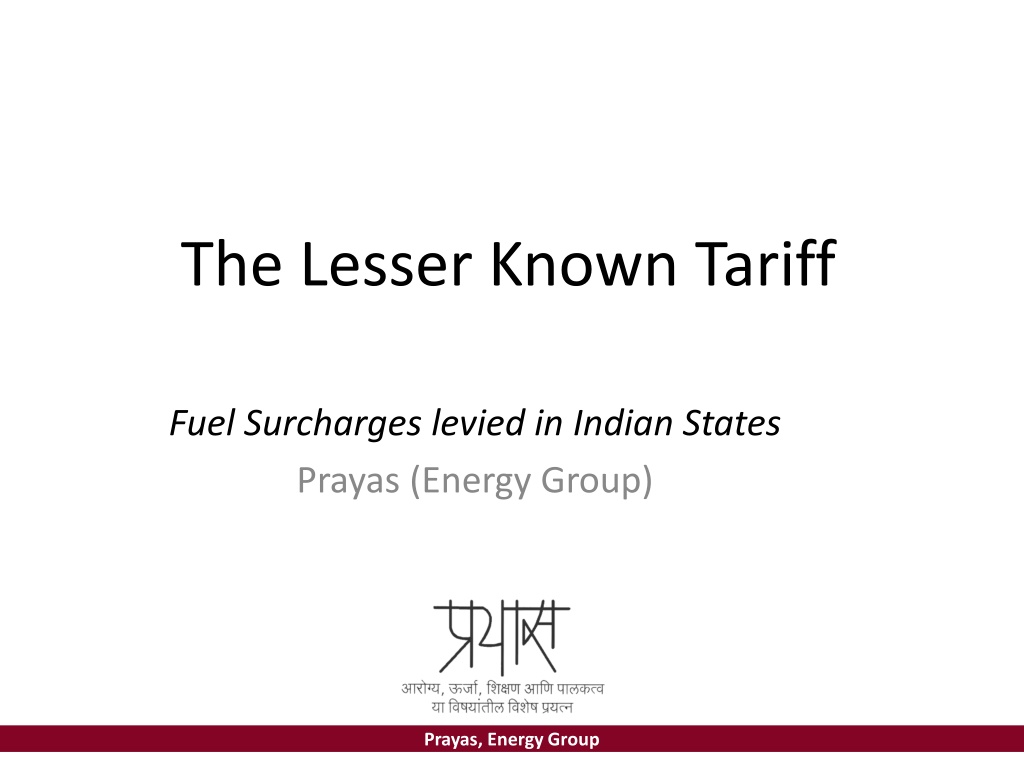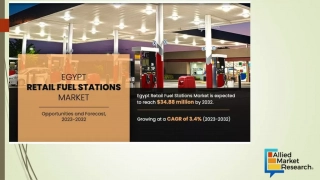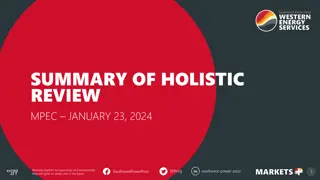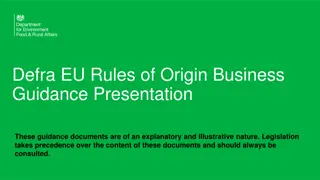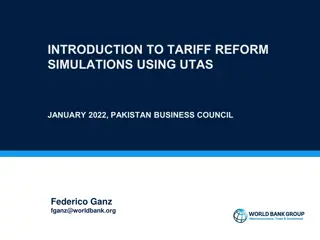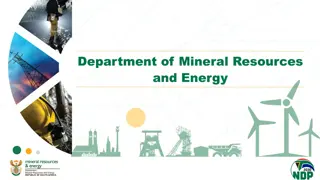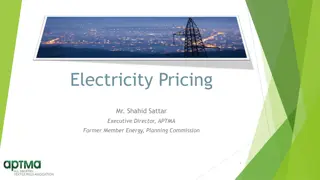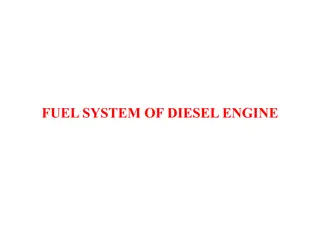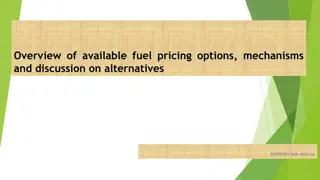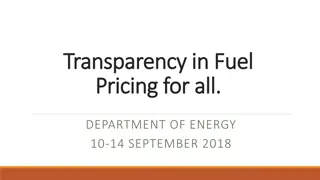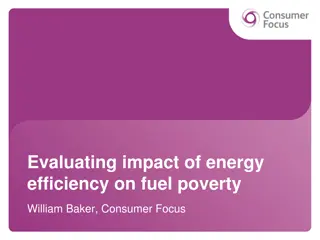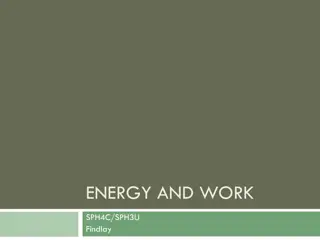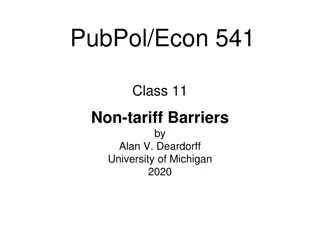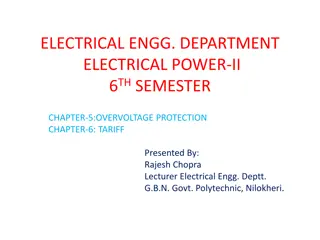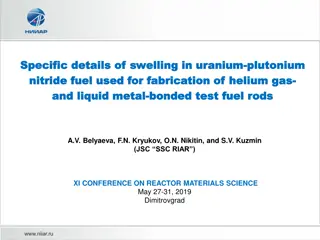Analysis of Lesser Known Tariff Fuel Surcharges in Indian States by Prayas Energy Group
This report by Prayas Energy Group delves into the lesser-known tariff fuel surcharges levied in 15 Indian states, highlighting the processes, practices, and policy implications. Fuel surcharges are crucial for addressing power procurement cost deviations and play a significant role in DISCOM viability. Despite the policy push, public acceptance is low due to transparency and accountability challenges. The report also covers the historical policy mandates related to fuel surcharges in the power sector.
Download Presentation

Please find below an Image/Link to download the presentation.
The content on the website is provided AS IS for your information and personal use only. It may not be sold, licensed, or shared on other websites without obtaining consent from the author. Download presentation by click this link. If you encounter any issues during the download, it is possible that the publisher has removed the file from their server.
E N D
Presentation Transcript
The Lesser Known Tariff Fuel Surcharges levied in Indian States Prayas (Energy Group) Prayas, Energy Group
Scope of report To understand the processes and methodology in the determination, collection and reconciliation of fuel surcharges Framework, regulations and practices for various states covered in report 15 Indian states namely, Assam, Bihar, Chhattisgarh, Gujarat, Haryana, Himachal Pradesh, Karnataka, Kerala, Madhya Pradesh, Maharashtra, Punjab, Rajasthan, Uttar Pradesh and West Bengal and erstwhile Andhra Pradesh Covers states which do not actively levy surcharges to highlight practices and experiences which can inform future implementation in other states. Focuses on state-owned distribution companies. Private DISCOMs in Maharashtra, Gujarat, Uttar Pradesh and West Bengal are not discussed. Data obtained from SERC regulations, orders, DISCOM petitions and commercial circulars, APTEL orders, Supreme Court judgments and various state and central government policy documents. Prayas Energy Group, Pune 2
What are fuel surcharges? Power procurement costs, can due to uncontrollable factors: change in fuel prices change in tax/cess rates revision of rail freight charges for coal transportation etc. Such expenses cannot be met through recovery of approved tariffs. Increases DISCOM s working capital requirement short-term liabilities. Leads to carrying cost to be recovered from consumers at the end of the year. Fuel surcharges are levied to address deviation in actual costs (especially power procurement costs) from costs approved by SERC at the beginning of the year. Per unit surcharge levied over and above tariffs which are approved by SERC on an annual basis. Typically levied on a monthly basis and determined on a quarterly basis. Prayas Energy Group, Pune
Why is it relevant? Fuel surcharges help avoid carrying cost for consumers and ease the cash flow situation of the generators and DISCOMs. Significant policy push as it is seen as a way to ensure generation viability and to reduce DISCOM liabilities Despite policy push, the response to adoption of fuel surcharges has been mixed. In states which have been actively levying fuel surcharges, the impact is significant. Accounting for 7% to 25% of total revenue recovered from consumers. Public acceptance of fuel surcharges is low not only because it is an additional tariff but also due to: Lack of transparency in determination Lack of adequate processes to hold DISCOMs accountable for costs incurred and recovery of surcharge Lack of public participation in determination and vetting of fuel surcharges. Prayas Energy Group, Pune 4
Policy Mandate before 2011 Name and Year Description Report of the committee on power chaired by V.G. Rajadhyaksha, 1980 Mid-year increases in wages and coal prices should be recovered through tariff review. Common Minimum Action Plan for Power, 1996 Fuel surcharges are to be automatically incorporated into the tariff. States like Andhra Pradesh, Odisha, Haryana, Rajasthan, and Karnataka allowed for fuel surcharge in the State Electricity Acts. Committees on reforms reiterated the need for fuel surcharges. State Power Sector Reform Acts, 1996 2000 Section 62 (4) states that No tariff or part of any tariff may ordinarily be amended more frequently than once in any financial year, except in respect of any changes expressly permitted under the terms of any fuel surcharge formula as may be specified. The Electricity Act, 2003 In Para 5.1 (h) (4), in the context of the Multi-Year Tariff regime, the policy specifies that uncontrollable costs should be recovered speedily to ensure that future consumers are not burdened with past costs . The National Tariff Policy, 2006 Prayas Energy Group, Pune
Policy Mandate post 2011 Name and Year Description APTEL Suo Motu Judgment in O.P. 1 of 2011 (Nov 2011) Directs SERCs to have mechanisms for fuel surcharge preferably on a monthly basis within 6 months from the date of the order . Shunglu Committee Report December 2011 Reiterated the need for fuel surcharge along with regular tariff revision and true-ups . The mandatory conditions of the bailout specifies that fuel adjustment costs be allowed as directed by APTEL to off-set the increase in power procurement cost . Financial Restructuring Plan, 2012 States should permit quarterly revision of tariff to offset fuel price increase as such tariff increase will be easier to implement and can be absorbed by consumers. Ujwal Discom Assurance Yojana (UDAY), 2015 Added Para 8.2.1 (7) which states that SERCs shall specify an appropriate price adjustment formula for recovery of the costs arising on account of variation in the price of fuel, power purchase, etc. on a monthly/quarterly basis for recovery of all prudent costs of the generating company and the licensee . Amendment to the National Tariff Policy, 2016 Prayas Energy Group, Pune 6
Implementation: Mixed response in states State Periodicity and regularity of levy Maharashtra, Gujarat, Madhya Pradesh, Karnataka, Punjab, West Bengal, Chhattisgarh, Haryana Levied on a monthly basis Rajasthan Not levied since 2015 16 Kerala, Himachal Pradesh Not levied since 2014 15 Bihar Not levied since 2013 14 Erstwhile Andhra Pradesh, Assam No levied since 2013-14 Uttar Pradesh, Tamil Nadu Not implemented States not regularly levying fuel surcharges despite commitment in MoUs signed under UDAY Rajasthan, Kerala, Himachal Pradesh, Bihar, Andhra Pradesh, Assam and Uttar Pradesh States not committed to quarterly revision of fuel surcharge under UDAY. Tamil Nadu and Telangana States which have been levying fuel surcharge on a regular basis, before being part of UDAY Maharashtra, Gujarat, Punjab, Haryana, Chhattisgarh, Madhya Pradesh, West Bengal and Karnataka Like regular tariff revision, regular levy of fuel surcharge takes place only with State Government commitment. Prayas Energy Group, Pune 7
Impact Share of Total Revenue Recovered through Fuel Surcharges Observations State Gujarat impact is high due to levy of a base fuel surcharge FY 15 FY 16 FY 17 Significant fuel surcharges in Maharashtra, Haryana and Chhattisgarh which have been levying surcharges > 5 years Maharashtra 5% 12% 4% Gujarat 28% 25% N. A. Nominal surcharges in Madhya Pradesh, West Bengal, Karnataka and Punjab, which have been levying fuel surcharges < 3 years Madhya Pradesh N. A. 2% 2% Karnataka N. A. 2% 2% Even states which currently do not levy fuel surcharges used to have high surcharges Punjab N. A. N. A. 1% Chhattisgarh 6% 5% 7% In 2011-12, share of revenue from fuel surcharge was: 15% for erstwhile Andhra Pradesh 9% for Bihar 17% for Assam. Haryana 11% 6% 10% West Bengal N.A N.A 3% N.A denotes not available. Prayas Energy Group, Pune 8
Assessment of costs Uncontrollable costs allowed - wide variations across states. Unscheduled Interchange/Deviation Settlement Mechanism Charges Disallowed in Rajasthan, Chhattisgarh, Himachal Pradesh, erstwhile Andhra Pradesh Allowed for recovery in Haryana and West Bengal Short term power procurement Disallowed in Rajasthan, Chattisgarh Allowed for recovery in Haryana, Himachal Pradesh, Uttar Pradesh, Maharashtra and West Bengal State specific treatments due to unique experiences and concerns REC costs disallowed in Gujarat Changes in coal quality from different sources allowed in Maharashtra Costs due to sale of power outside state disallowed in Chattisgarh Beyond fuel costs Costs due to change in transmission charges allowed in Gujarat and U.P Prayas Energy Group, Pune 10
Assessment of sales Metered sales as per actuals, unmetered sales as per ERC estimates Treatment for sales for exempt categories If subsidised, included in sales If cross-subsidised, not included in sales Consumer categories exempt States Madhya Pradesh, Maharashtra, Rajasthan, Chhattisgarh , Assam Erstwhile Andhra Pradesh, Karnataka and Gujarat, Haryana Himachal Pradesh No exemptions Agricultural consumers Below Poverty Line (BPL) consumers . Domestic consumers using < 20 units per month Kerala BPL and agricultural consumer. Punjab, Bihar Agricultural, domestic consumers using < 300 units per month West Bengal Prayas Energy Group, Pune 11
Subsides and treatment of T&D losses States which provide subsidies Gujarat, West Bengal, Haryana, Karnataka, and Punjab Subsidy support provided in 2015-16 (Rs. Cr.) As % of revenue from fuel surcharges States Punjab 14 9% Haryana 378 27% Gujarat 2596 29% T&D losses Actual T&D losses are typically higher than the normative losses. All states use gross up sales using normative T&D losses Thus, sales estimated will be than actual sales and norm-based per-unit surcharge will be lower. Costs incurred due to excess T&D losses are not recovered from consumers Prayas Energy Group, Pune 12
Ceiling levied and under/over-recovery of charges State Fuel surcharge to not exceed Maharashtra 20% of energy charges Gujarat, Karnataka 10 paise per unit. In Gujarat this above base fuel surcharge of Rs.1.43/unit Haryana, Rajasthan, Himachal Pradesh Bihar Uttar Pradesh Chhattisgarh Assam Madhya Pradesh, Punjab, West Bengal, erstwhile Andhra Pradesh and Kerala 10% of approved average power purchase cost 10% of approved average cost of supply 10% of variable component of tariff 5% of total tariff for domestic consumers using < 200 units per month. 25% of variable power procurement cost No limit specified Power purchase as the basis for the per unit ceiling can result in undue tariff impact High ceiling not desirable without regulatory approval, public attention . Power procurement accounts for more than 75% of the costs incurred Any cap based on power procurement will be significantly high. Energy charges is preferable as a base for ceiling Reflects cross subsidy design and prevents undue tariff impact Treatment of costs if it exceeds ceiling Recovered in same quarter post regulatory approval in Gujarat, Assam, Karnataka, Maharashtra Recovered with applicable carrying costs in subsequent periods in other states. Prayas Energy Group, Pune 13
Processes for determination and levy of fuel surcharge Transparency Participation Accountability Consultation process during change in regulations Regulatory Approval of fuel surcharge Announcement of charges Consultation process during determination of fuel surcharge Post facto vetting or verification of costs Information on assessment of costs Consultation process during vetting or verification of fuel surcharge Information on category- wise Post facto vetting or verification of under- recovery and over- recovery of fuel surcharge under -recovery or over- recovery of costs Prayas Energy Group, Pune 14
Transparency Provisions States DISCOMs only announce the applicable per unit fuel surcharge rate Madhya Pradesh, Rajasthan, Haryana and Himachal Pradesh Month-wise approved and actual costs for each power station, applicable T&D losses , metered and unmetered sales Punjab, Bihar, Assam, Maharashtra, erstwhile Andhra Pradesh, West Bengal, Chhattisgarh, Kerala, Gujarat and Haryana Reports all information as states listed above except station- wise costs Karnataka All states announce applicable fuel surcharges, report it in consumer bills Some states also report disaggregated cost information, applicable sales and information of T&D losses No state studied reports category-wise under-recovery or over-recovery. Prayas Energy Group, Pune 15
Regulatory Approval and Scrutiny Regulatory approval of fuel surcharges Practice in Assam, Haryana, Punjab, Karnataka and erstwhile Andhra Pradesh Approval needed in special cases (Maharashtra, Gujarat, Bihar, Punjab) Provisions to ensure timely and correct submission of claims Penalties for furnishing wrong data in erstwhile Andhra Pradesh Forfeiting claims in case of delay in submission in Assam and erstwhile Andhra Pradesh Effective if forfeited claims is not recovered in annual process with carrying cost. SERC directives Due to under-recovery, West Bengal ERC directed DISCOM to recover all eligible costs through fuel surcharges, else costs will be disallowed during true-ups Due to non-implementation of fuel surcharges UPERC directives specified disallowance of eligible costs during true-up process. Prayas Energy Group, Pune 16
Vetting of costs, revenue recovered Quarterly vetting only in Maharashtra Vetting has faced significant delays in the past 20 month delay in 2013, 21 month delay in 2014, 12 month delay in 2015 and 5.2 month delay in 2016. Delays have implications on carrying costs. Vetting in approval orders Karnataka, Bihar, Assam, Kerala, Punjab, and erstwhile Andhra Pradesh have approval orders but without vetting. Haryana approval orders have vetting as well but the orders are issues once in 2 to 3 years. Treatment of fuel adjustment charges, revenues in tariff orders No detailed vetting in tariff orders Maharashtra, Punjab, Bihar, Chhattisgarh, Assam and erstwhile Andhra Pradesh specify revenue recovered through fuel surcharge and tariff increase is specified over and above surcharges Prayas Energy Group, Pune 17
Public Participation Determination of framework/regulations for fuel surcharges All states have public consultation processes except Gujarat During fuel surcharge determination Most states do not have any public consultation during determination The exceptions are Kerala and erstwhile Andhra Pradesh public comments were sought and public hearings were conducted comments and the responses are recorded in the final order. this is despite a quarterly determination process for fuel surcharges Haryana ERC conducts periodic processes once in 2 to 3 years public hearings, comments and responses were recorded in the final order. Limited vetting in tariff determination processes Public comments are restricted to consultations or hearings during the tariff determination or true-up process in all states Prayas Energy Group, Pune 18
Practices in select states Prayas Energy Group, Pune 19
Levy of base fuel surcharge in Gujarat Gujarat ERC annually approves a fixed fuel surcharge in their tariff order. This is known as base FPPPA. Base FPPPA ~ 20% to 25% of the total revenue projected for the year. An additional amount is recovered every month through incremental fuel surcharge Base FPPPA is determined based on average fuel surcharge levied in previous years 2011 12 to 2013 14 Rs. 0.61/unit, (fuel surcharge for 2009 10) 2014 15 to 2016 17 Rs.1.20 /unit (fuel surcharge for 2012 13) 2017 18 Rs. 1.43/ unit (fuel surcharge 2015 16) Despite high fuel surcharges, there is a lack of regulatory scrutiny of final fuel surcharge levied, nor any accountability for over-recovery or under-recovery of costs The levy of a base FPPPA could also be seen as a way to increase tariffs without much public scrutiny. It is in consumers interest if the SERC includes the recovery of such costs via tariff increase itself, rather than by levying a base FPPPA. Prayas Energy Group, Pune 20
Levy of additional charge in Maharashtra MERC disallowed additional surcharge. Any amendment to tariff, except fuel surcharges should be done once a year via a public process. MSEDCL petition in 2013 for costs recovery due to review order through an additional charge, similar to fuel surcharge in levy. MSEDCL delayed filing tariff petitions and more costs to be recovered due to various APTEL orders started accruing. In April 2013, MERC directed costs to be included in next years tariff petition. MERC s 2015 MYT regulations allow recovery of impact due to decisions of higher courts, review orders on an annual basis. In September 2013,MERC allowed recovery of these costs via an additional surcharge through a suo- motu process without public hearings. The order was set aside by APTEL and MERC had to undertake due tariff process to account for costs. MERC did not follow its own precedent when it came to additional charges. Given delay filing in tariff petitions, the SERC could have undertaken a more public and transparent suo motu tariff determination process. The new MYT regulations have addressed the mode of this recovery. Prayas Energy Group, Pune 21
Carrying cost in Haryana Fuel surcharge capped at 10% of APPC but fuel surcharge is often higher than cap Excess costs recovery is carried forward and recovered over 2-3 years along with additional fuel surcharge over subsequent period Not recovered in the annual tariff determination process or through SERC approval This incurs significant carrying cost which could have been avoided with annual reconciliation of costs Fuel surcharge as % of revenue recovered 19% 18% 14% 11% 6% 10% Carrying cost as a % of total fuel surcharge 10% 25% 22% 24% 31% 8% Year 2011 12 2012 13 2013 14 2014 15 2015 16 2016 17 Prayas Energy Group, Pune 22
Need for a framework and key insights1 Large variations in the regulations and the practice of levy of fuel surcharge across states Need for a guiding framework at the national level which the states can refer to while implementing fuel surcharge. Such a framework can be based on implementation experiences in various states The framework could be developed by the Ministry of Power or the Forum of Regulators Could act as a practice guide for fuel surcharge levy. SERCs could be free to adopt and adapt practices suitable for their state realities. Prayas Energy Group, Pune 23
Need for framework and key insights2 Recovery through fuel surcharges to be limited to uncontrollable costs: Other cost-heads which can be considered should be specified ex-ante in regulations, orders Ad-hoc inclusion of costs will reduce the legitimacy of the process. SERCs to provide information to encourage informed public scrutiny of surcharge SERC to report potential reduction in revenue requirement (by avoiding carrying costs) SERCs can regularly publishes details of station-wise costs passed on to consumers, revenue recovered, subsidy availed, carrying costs applied and the detailed calculations done by the DISCOMs / ERC Penalties for delays in filing Forfeiting of cost recovery due to delayed filing Alternatively, costs claimed under fuel surcharge should not be subject to carrying costs. Unless delay is due to exigent circumstances / delay in action by the SERC SERCs to initiate suo motu proceedings in case of delay Prayas Energy Group, Pune 24
Need for framework and key insights3 Ceiling on fuel surcharges based on energy charges with carrying cost settlement at the end of the year Ceilings on the basis of power procurement costs can be high and carrying costs build-up can defeat the purpose of levying fuel surcharges. Levy of fuel surcharge should not change the cross-subsidy structure and tariff design: Akin to tariffs, there is a need for support to consumers with low paying capacities. Emphasized in a 2016 Supreme Court judgment on the levy in Andhra Pradesh . Extent of support through subsidies and cross-subsidies can vary given state realities, and needs to be deliberated by the Commission. Detailed vetting of costs and revenue recovered to take place with tariff determination process: Ideally, quarterly vetting and verification of costs by SERCs should be adopted . If such a process is onerous, detailed vetting should be part of every tariff determination process. Prayas Energy Group, Pune 25
Thank you ann@prayaspune.org manabika@prayaspune.org shantanu@prayaspune.org Prayas, Energy Group 26
